This blog is intended to serve as a digital hub and web-space for Indo-Caribbean diasporic cultural creation and current events. DISCLAIMER: unless otherwise noted, the rights to all published content featured on this blog belong to their respective owners/writers and are credited. Please do not remove the credits. Posts originating on tumblr are reblogged from the original blogger.
Don't wanna be here? Send us removal request.
Text

Coconut/Cane & Cutlass (1994), 16mm/30 min, dir. Michelle Mohabeer.
Coconut/Cane & Cutlass is a fluid rumination on the psyche, collective memory, history and imagination of Indo-Caribbean cultural identity. This poetic rumination on exile and displacement is mediated from the perspective of the filmmaker, a mixed race Indo-Caribbean lesbian who migrated to Canada over thirty years ago.
“Coconut/Cane & Cutlass metaphorically speaks about the enclosure and denial of queer sexuality in the Caribbean through a multiple layered front screen projected image of two women vertically posed in an intimate moment, framed behind the barbed wire – conjuring the censored queer body and antiquated buggery laws in the Caribbean against expressions of queer sexuality. It became this far greater political commentary than simply being this personal film. I also utilized the paired image of two women to take the viewer on a historical journey which began with the voyage from India across the Kala Pani (black water) to the Caribbean. These dual images of mother-daughter, lovers, sisters, they could be anything, the representation of these two women was symbolic of the fluid journeying motif in the film.” — Mohabeer, 2015 [x]
599 notes
·
View notes
Quote
If I should ever die Return me to the fire If I should live again Return me to myself. Heartfire, flame in hurricane-lamp Outside, into this storm.
Mahadai Das, Return Me To The Fire
9 notes
·
View notes
Quote
I want to be a poetess, a beautiful, exalted instrument, for my people.
Mahadai Das, pioneering Guyanese poet
7 notes
·
View notes
Photo

by Sacintya Mohini Simpson.
227 notes
·
View notes
Link
“The Shaanti Bhavan Mandir is a surprisingly humble temple to take such a public role in the [sanctuary] movement. The small storefront congregation is on Jamaica Avenue in the Richmond Hill neighborhood, under the elevated tracks of the J train. Its small banner is draped over the sign of a former real estate agent’s office whose space the temple is renting. It was founded five years ago by Pandit Manoj Jadubans, 44, a Guyana native, who, with a group of supporters, wanted to broaden what modern Hindu practice could look like.
One of hundreds of small Indo-Caribbean temples in that corner of Queens, it has sought to distinguish itself by focusing on the younger generation, acts of service and the environment. Its youth group’s motto is “the hands that serve are holier than the lips that pray.” Among other actions, it participates in regular beach cleanups though Sadhana, a coalition of progressive Hindus that also played a key role in encouraging the temple to become a sanctuary.”
#national sanctuary movement#progressive hindus#sadhana#shaanti bhavan mandir#indo-caribbean#indo-caribbean american#indocaribbean#indoguyanese#indotrinidadian#coolie#hinduism
88 notes
·
View notes
Photo



Her name was Vanessa Raghubar and she was only 22 years old.
#SayHerName
49K notes
·
View notes
Link
In case people don’t know, Guyana-born Gina Miller brought a case challenging the constitutionality of implementing Brexit without first debating it in Parliament and won!
She fought for this case at great personal risk to her and her family, which you can read more about here and here.
2 notes
·
View notes
Link
“A Massachusetts man who yelled that President Donald Trump “will get rid of all of you” faces nine hate crime charges for assaulting a female Muslim airline employee at New York’s John F. Kennedy International Airport, authorities said.
Robin Rhodes, 57, of Worcester is accused of assaulting Rabeeya Khan, a Guyanese mother of four who migrated to the United States 13 years ago.
She was wearing a hijab, or head scarf, while working at Delta Airlines’ Sky Lounge on Wednesday evening,when the incident occurred.”
0 notes
Link
((Domestic violence tw)) “Intimate partner violence is hardly unique to the Indo-Caribbean community—it is a pervasive phenomenon that touches every corner of the United States and elsewhere. A 2015 study from the Violence Policy Center found that 1,600 women had been killed by men in a single year, with the vast majority (94 percent) of the murders perpetrated by someone the woman knew. Yet particular factors can shape the way this violence manifests within specific communities. LGBTQ people experience higher rates of domestic violence than their straight or cisgender peers, a trend which researchers have attributed to homophobia and other external stressors of being part of a minority group. The Jahajee Sisters have identified factors that affect domestic violence amongst Indo-Caribbeans, as well. “We believe that the violence in our community and silence surrounding it partly stem from our colonial roots,” said Bourne in an email.”
#domestic violence#indo-caribbean#indo-guyanese#Rajwantie Baldeo#indo-trinidadian#coolie woman#coolie women
20 notes
·
View notes
Photo
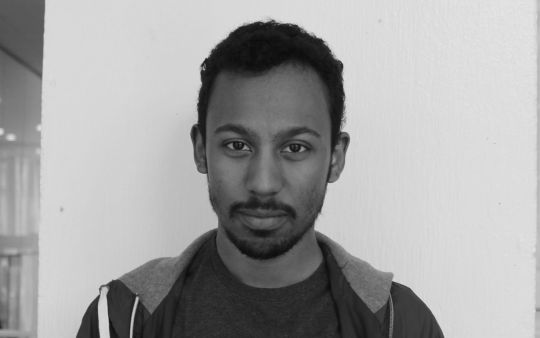
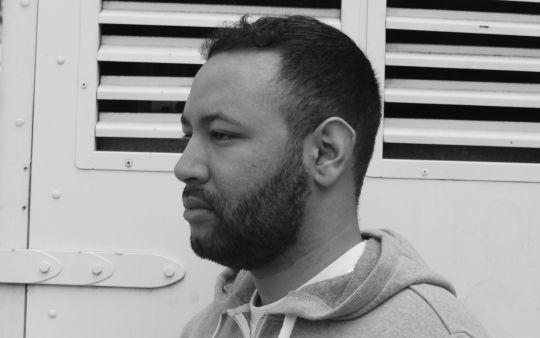
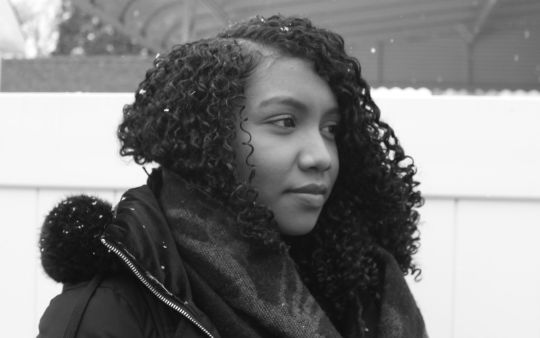

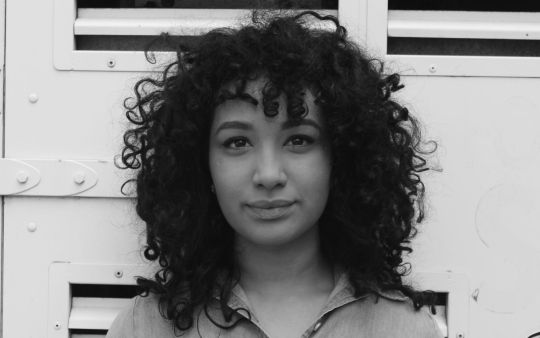
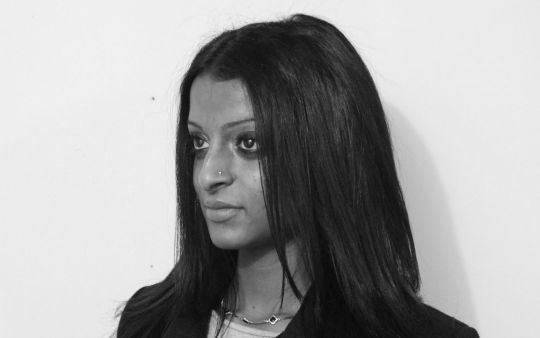
Mark Hendrax
Dougla
2015
Photoseries
5in x 8in
“This photoseries depicts Caribbean people considered “dougla,” a slang term used in Guyana to refer to individuals of mixed East Indian and African descent.”
This is a photoseries I created for a race-related art event. The theme was “Labels.”
Posting for some mixed-race and West Indian representation in reclaimthebindi
573 notes
·
View notes
Photo
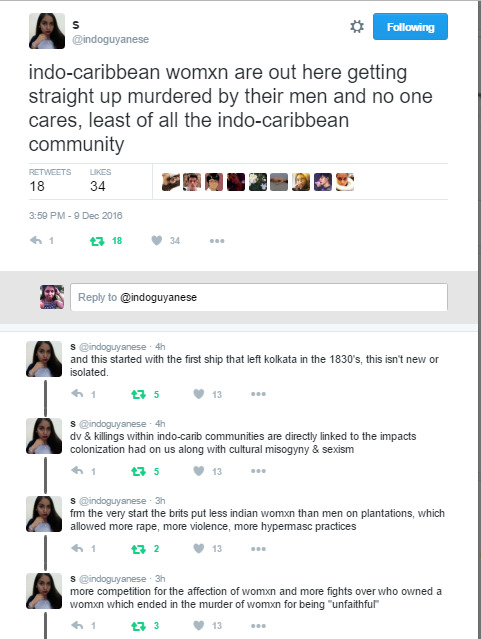
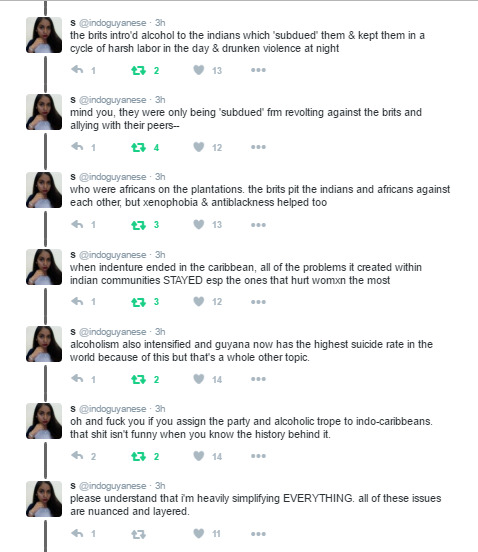
@indoguyanese breaking down the colonial influence and legacies of hypersexualization, dehumanization, and control of Indo-Caribbean indentured women as well as alcoholism among indentured laborers and their descendants. follow her on twitter for more on Indo-Guyanese diasporic identity and feminism.
#indo-guyanese#indo caribbean#coolie#indenture#indo guyanese#indo trinidadian#diaspora#indo-caribbean#colonialism
45 notes
·
View notes
Quote
Since the era of Indian indentureship, the narrative of the jealous Indo-Caribbean husband has been used to justify the brutalities of gender-based violence. In 1881, the Protector of Immigrants in Trinidad declared, "Chastity is almost unknown to the class of woman indentured from India to this colony.” Branding the indentured woman as sexually licentious set the stage for devaluing the life of an Indo-Caribbean woman and justifying the brutality of her murder. The “jealous” husband, the “crimes of passion,” and the proxy language of inevitability continues to perpetuate the mistreatment, abuse and murders of Indo-Caribbean while refusing to name its core: a pernicious cycle of victim blaming with culturally justifiable rape culture at its core.
Suzanne Persard, The Value of an Indo-Caribbean Woman’s Life
#indo-caribbean#indo caribbean#indenture#indentureship#suzanne persard#indo-caribbean women#coolie woman#coolie women#domestic violence#colonialism#intimate partner violence#indo guyanese#indo trinidadian
310 notes
·
View notes
Link
Suzanne Persard ─ a founding member of Jahajee Sisters, “the first organization in the U.S. for Indo-Caribbean women committed to ending gender-based violence” ─ on the recent brutal murder of Rajwantie Baldeo (an Indo-Guyanese woman) in public in Queens, NYC at the hands of her estranged common-law husband and the looming legacies of colonially-sanctioned, gendered violence.
#rajwantie baldeo#suzanne persard#indo caribbean#indo guyanese#indo trini#feminism#coolie#diaspora#south asian
27 notes
·
View notes
Photo
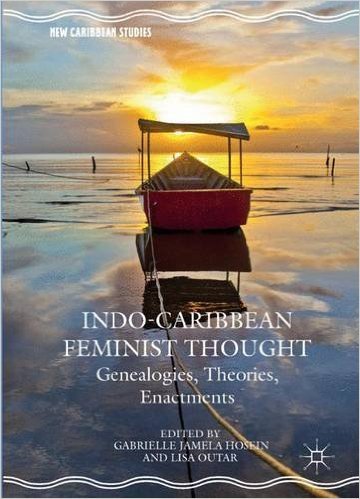
Bringing together three generations of scholars, thinkers and activists, this book is the first to trace a genealogy of the specific contributions Indo-Caribbean women have made to Caribbean feminist epistemology and knowledge production. Challenging the centrality of India in considerations of the forms that Indo-Caribbean feminist thought and praxis have taken, the authors turn instead to the terrain of gender negotiations among Caribbean men and women within and across racial, class, religious, and political affiliations. Addressing the specific conditions which emerged within the region and highlighting the cross-racial solidarities and the challenges to narratives of purity that have been constitutive of Indo-Caribbean feminist thought, this collection connects to the broader indentureship diaspora and what can be considered post-indentureship feminist thought. Through examinations of literature, activism, art, biography, scholarship and public sphere practices, the collection highlights the complexity and richness of Indo-Caribbean engagements with feminism and social justice.
Table of contents and ordering information available here
82 notes
·
View notes
Photo
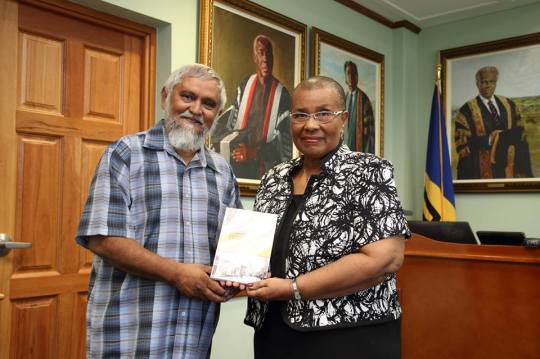

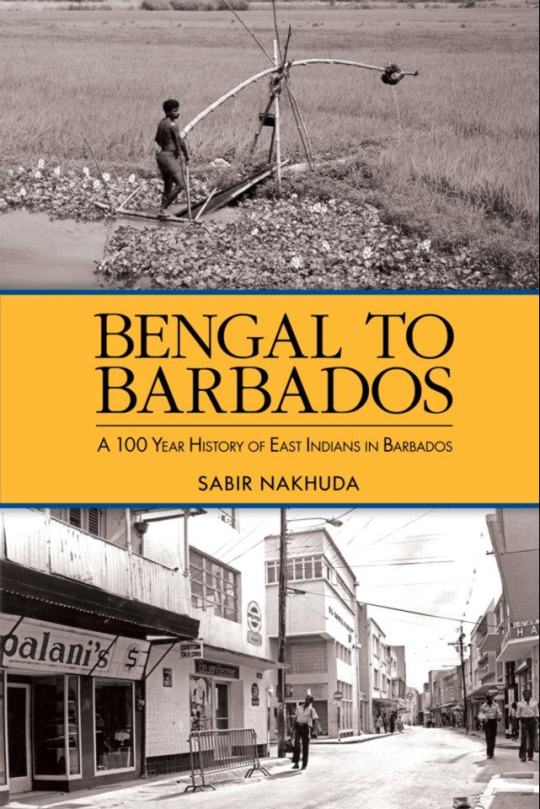
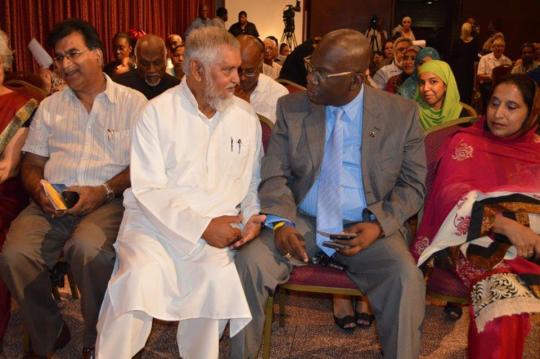
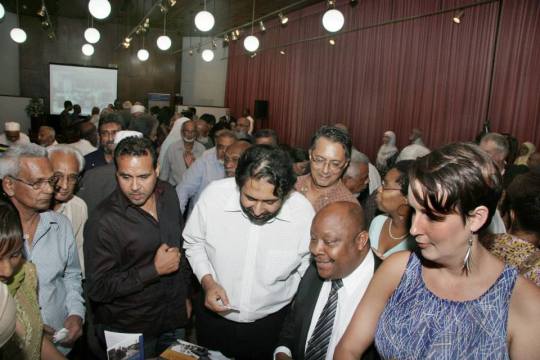

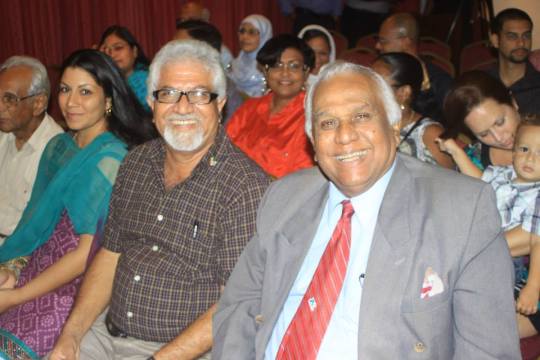
A 100 year history of East Indians in Barbados book by author Sabir Nakhuda. First of its kind oral history research on east Indians in Barbados. Foreword written by the Prime Minister of Barbados, the honorable Fruendel Stuart.
164 notes
·
View notes
Text
Noah fence but y'all white people want to talk about colonialism like its ancient history but the current queen of England was literally already queen when my dad was a kid and Trinidad was an English colony and he was beaten in missionary school by his white teachers for speaking Hindi and refusing to convert to Christianity
57K notes
·
View notes